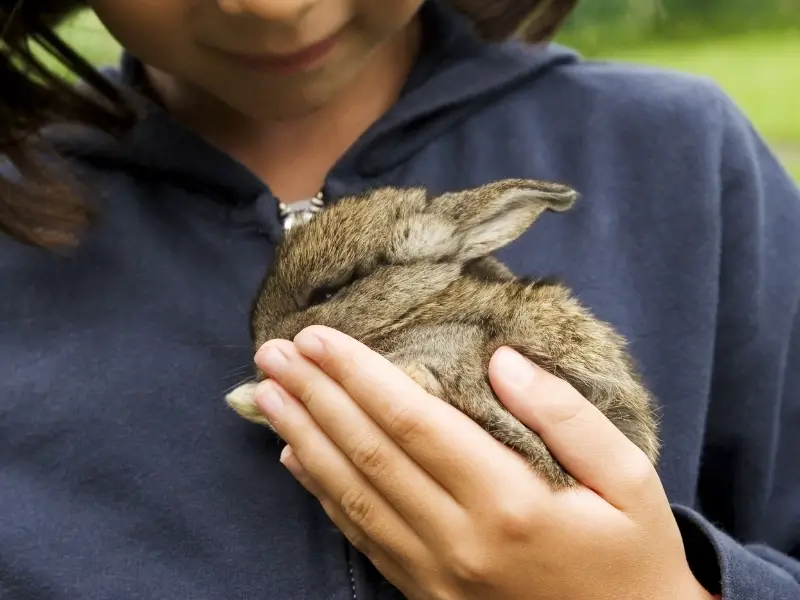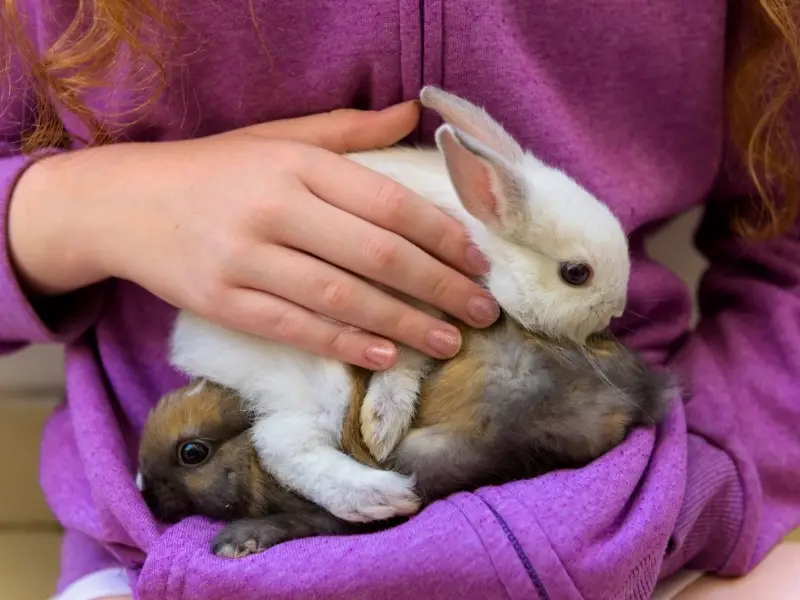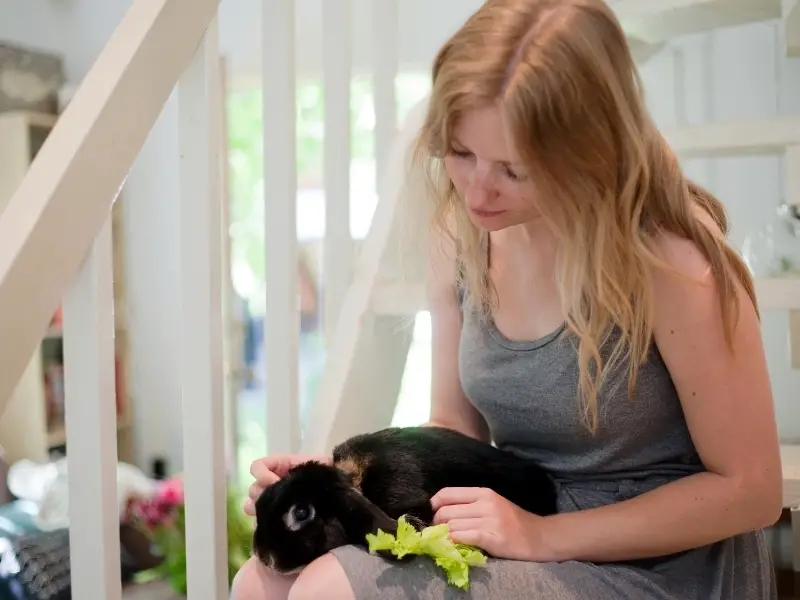We know that dogs are good pets for dog lovers and cats make good pets for cat lovers. What about rabbits?
Do you have to be a bunny person to enjoy having a rabbit as a pet? Are rabbits easy to care for? We already know they are fluffy and cute, but that doesn’t mean a long-eared ball of fur will be an ideal pet for you.
So are rabbits good pets? In general, yes, rabbits are great pets. They are social and affectionate, forming close bonds with their owners. They respond well to litter and clicker training, and they can be taught to do tricks. However, your rabbit should be kept indoors because they are prey animals. They should have time and space to exercise and have lots of chew toys.
Are rabbits good pets for everyone, kids included? Let’s find out.
Do Rabbits Make Good Pets?
Rabbits do make good pets, but this may not be the case if you think they are low-maintenance animals.
They require quite a bit of care. Knowing what to expect sets you up to be a good pet rabbit owner.
Are Rabbits High or Low Maintenance?
Rabbits need daily care and they are high maintenance pets. They need lots of hay and other fresh food like well-washed green leafy veggies and freshwater every day. A rabbit’s den, hutch, or cage also needs to be cleaned daily.
You also need to spend time with your rabbit, as it is a very social animal. It also needs lots of chew toys and space to run around.
If your rabbit doesn’t get lots of attention every day and appropriate toys, they may become destructive.
Reasons Rabbits Make Good Pets

Here are reasons rabbits make good pets so you can get a clearer idea of what you are in for if you opt to adopt a rabbit or get one from the pet store:
Quiet
Unlike dogs that can bark a lot (without proper training), bunnies are quiet animals. They do make sounds, but you don’t have to worry about meows or barks like when cats or dogs demand attention.
Training
Like dogs, you can train your bunny to do tricks. This is a great bonding opportunity. You can teach your bunny to give you hugs, kisses, and even high fives.
When you call your Flopsy, they will come when trained, and you can also teach your rabbit to jump through an agility course or two or spin in a circle.
Litter Training
Your pet rabbit poops a lot (well, it eats a lot too, so this shouldn’t be a surprise), and if you litter train your bunny, it’s easy to clean up after them.
You’ll find that it is easier to litter train a rabbit that’s been spayed or neutered. An unneutered rabbit will claim and mark its territory by scattering poop and spraying urine.
Cleanliness
A messy and unclean rabbit is not something you will have to worry about. Rabbits are clean, meticulously so. They also don’t smell, and even their poop doesn’t have a strong odor.
Only a rabbit’s urine, which is high in ammonia, may smell. But this is easy to fix. Simply clean your rabbit’s hutch every day.
Long Lifespan
Good news if you have a bunny! Your pet will be with you for quite a long time as rabbits live 10 years on average.
This also means when you decide to get a pet rabbit that you need to be ready for the commitment. While 10 years is a long time, rabbits make excellent pets and they can be a great buddy.
How long your rabbit lives depends on the breed (hint: smaller rabbits live longer than larger breeds) and how well they are cared for. The oldest rabbit lived for nearly 19 years… maybe you can beat Flopsy’s Guinness World Record?
Affectionate
As social pets, rabbits like attention and will like hanging out with you. If they are happy, they’ll climb onto your lap and purr, and when they are excited, they may run around your feet in circles.
Gentleness & Love to Be Petted
Rabbits can be shy animals, but once they are comfortable with you, they easily come to you for attention, to be petted, or for treats.
Bunnies love to be massaged and petted, and they can easily sit for hours with you while you gently scratch them behind their floppy ears or on top of their head.
Just note that a kitten (or baby rabbit) is usually energetic and fidgety. Generally, only older rabbits will be calm and spend long periods of time with you.
A+ for Adorableness
We can’t forget to mention how adorable bunnies are, can we?
There’s the fact that they are fluffy little furballs, and doesn’t your heart just melt when they wash their faces? Or what about when they stand up on their hind legs, begging for attention or treats?
Reasons to NOT Get a Pet Bunny

If you are adequately prepared for what you are getting into when getting a rabbit as a pet, then these are reasons to NOT get a bunny. Instead, they are just aspects of rabbit ownership you should be aware of.
Thumping
Not necessarily a con, but the only noise that is loud that a bunny makes is when they thump their hind legs against the floor. While not common behavior, your rabbit may thump if it is angry at you or if it is scared.
Chewing
Bunnies like to chew—everything, and pretty much all the time too. To keep their teeth from overgrowing (yes, they are like a human’s fingernail that just never stops growing), they chew.
Their instinct tells them to chew anything that is made of wood, so watch out for your wooden furniture. And also keep wires out of the way. Can you imagine needing to use your microwave to heat up dinner, only to find the wire has been gnawed on?
Besides you not being able to warm up your dinner, chewing on wires is also very dangerous. Your bunny can easily get electrocuted. Keep your bunny safe by covering wires that are within their reach with plastic split tube covers.
You can easily curb this behavior by rabbit-proofing your home or giving them lots and lots of appropriate chew toys.
No Holding or Picking Up
Rabbits don’t like to be picked up, and this is why they don’t make ideal pets for kids unless you train your child how to take care of their bunny.
Bunnies do like to be petted but not held or hugged. Holding your rabbit will make them feel trapped and they will get scared, and since they are prey animals, they depend on being able to get away when they feel threatened.
Lots of Space
The rabbit cages you buy online or at your pet store are usually too small for your bunny. The general rule is that the cage length should be 3-4 times the length of your rabbit (so measure when your bunny sprawls out, from their nose to their toes).
If your pygmy rabbit is 8 inches in length, then your rabbit hutch should be at least 24-32 inches in length, while if you have a larger breed rabbit that is 20 inches in length, then your cage should be 60-80 inches in length.
Besides where they live, rabbits also need lots of space to hop around. This space should be at least 24 square feet; however, any room in your house or apartment should work just fine for your rabbit to play and exercise in for 2-3 hours per day.
Just supervise your little fluff ball to ensure it doesn’t get itself into any trouble.
Shedding
Rabbits shed a lot, so expect to clean up clouds of fluffy fur. You can’t groom your bunny as they don’t like to be groomed. Get your vacuum, broom, and duster ready!
Attention Seekers
Bunnies need a lot of attention and leaving them alone all day leads to boredom, destructive behavior, and depression.
So spend as much time with your bunny as you can by petting them and giving them the love they need. If you can’t be home all day and play with them, then get another rabbit so they can bond and keep each other company.
The Diet
If you think rabbits just eat leafy greens and carrots, think again. They have a complicated diet due to their sensitive digestive systems.
If you don’t feed your rabbit appropriately, they’ll develop gastrointestinal complications, and your bunny will suffer and could even die.
In general, feed your rabbit lots and lots of grassy hay, leafy greens, pellets, and treats.
Expensive Vet Care
The anatomy of a rabbit isn’t like that of cats and dogs, so your vet needs to specialize in caring for small animals.
Expect to pay $100-150 annually for an examination and $200-500 to get your rabbit spayed or neutered.
Pros and Cons of Pet Rabbits
Let’s sum up the pros and cons of pet rabbits:
Pet Rabbit Pros
Here are the advantages of getting a bunny:
- Long lifespan, so you’ll have a buddy for at least a decade if not longer
- Rabbits are trainable
- They are affectionate, super adorable, and love to be petted
- They are quiet, so ideal if you live in the city or have neighbors who don’t like noisy pets
- They are clean animals, so no weird and funky smells to worry about; just keep their hutch clean
Pet Rabbit Cons
Here are the disadvantages of getting a bunny:
- They don’t like to be held or hugged
- They chew, a lot, so rabbit-proof your home
- They are prey animals, so you can’t have a cat or large dog breeds with a pet bunny, or leave your bunny alone outside
- Rabbits need lots of space and attention, as well as a special diet
- Vet care can be expensive
What to Consider When Choosing a Pet Rabbit
Rabbits are excellent pets, provided you know what you are in for. Here are some key aspects to consider when choosing a pet rabbit:
Bunny Age
Your bunny’s age before you get a pet rabbit is one thing to keep in mind.
It isn’t necessarily easier to train a baby rabbit, and kittens are very active and still need to explore their world.
An adult rabbit can be easier to train, and they are generally calmer too, so you pet them for hours while you chill out with Netflix.
Your Family Structure
Rabbits are fragile animals. They get scared easily and don’t like feeling trapped, like when you hold or want to hug them.
As such, it is usually not recommended to get a rabbit or two when you have young kids around. But this isn’t to say you shouldn’t get a rabbit. Just closely supervise the little humans in your family while they handle and care for the bunny and train them how to properly take care of Flopsy.
Another consideration is your other pets. There are certain dog breeds and cats that will hunt and kill your bunny or eat it. Learn more about rabbits as prey and their predators in our article.
Bunny Breeds and Personality
Also, think about if you want a small rabbit or a larger animal. The American Breeders Association recognizes over 30 rabbit breeds, and each of these has specific needs.
While smaller bunnies may live longer, larger bunnies need more space to exercise. Depending on the breed, the rabbit can be jumpy and shy at first.
Conclusion
Rabbits definitely make good pets. If you want a pet that’s quiet, clean, non-smelly, can be trained, affectionate, and super adorable, then a rabbit is the ideal pet for you.
There are some “cons.” Rabbits need space, don’t like to be picked up, have special dietary requirements, expensive vet care, are attention-seeking, and chew a lot—so watch out for your wooden furniture and wires!
But these are only precautionary things you should know about before bringing the bunny home that stole your heart at the pet store.

